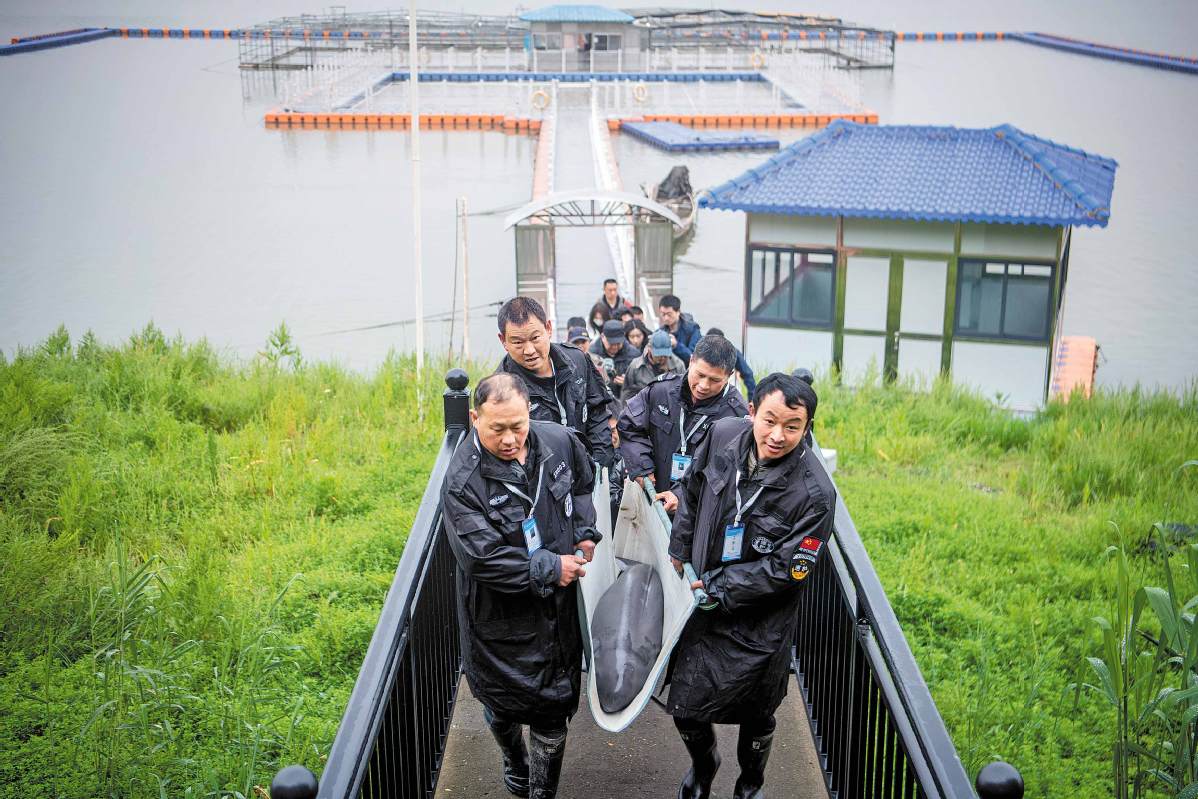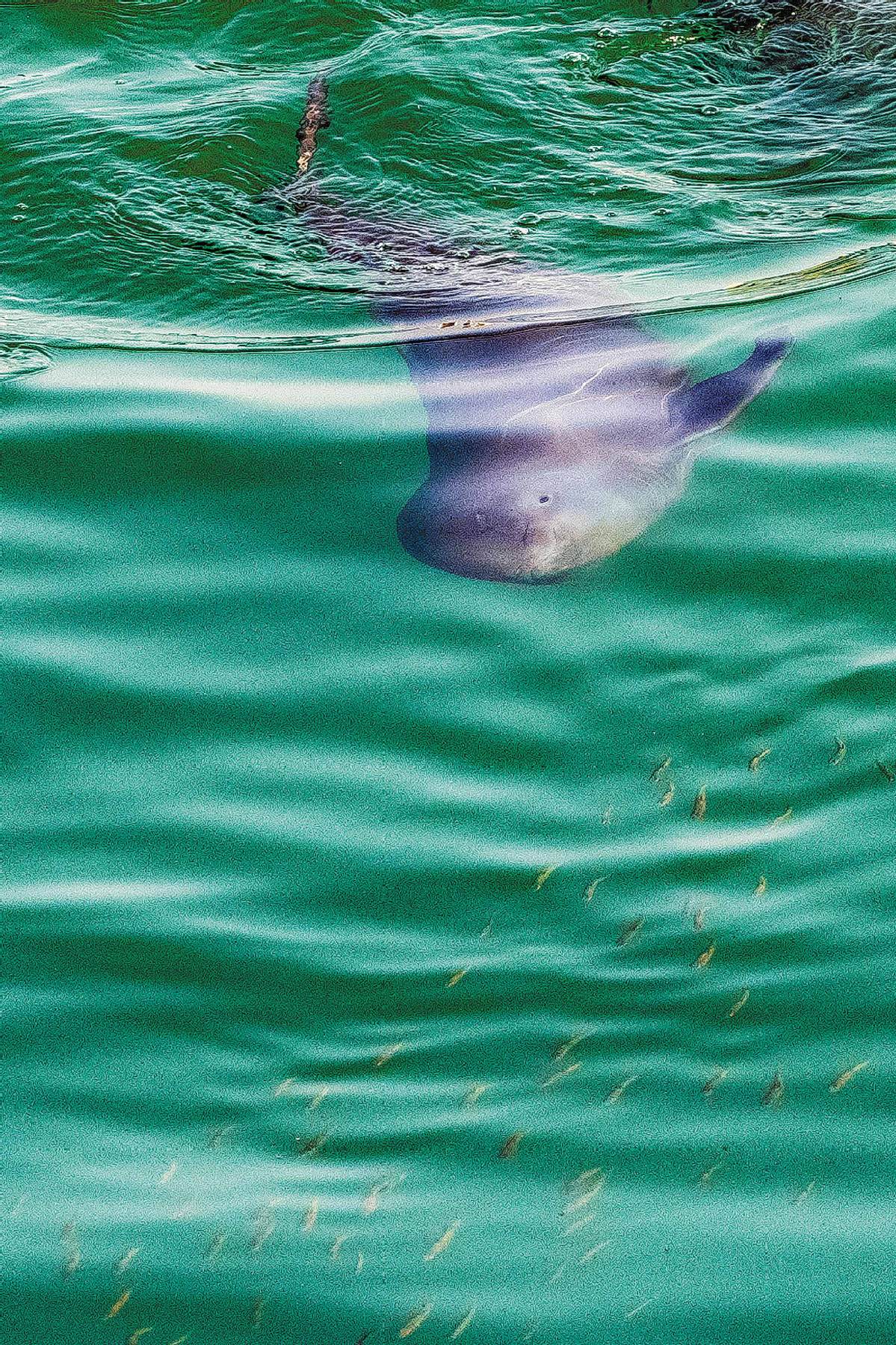Making 'Smiling Angels' smile again
2023-10-09 16:10:47
China Daily
Updated: Oct 5, 2023
Protections have resulted in the rise of the Yangtze finless porpoise population
Known as "Smiling Angels", the Yangtze finless porpoise is the unique flagship species of the Yangtze River Basin, and is widely believed to be an important natural indicator of the health of the Yangtze River ecosystem.
However, for decades, the numbers declined dramatically due to habitat loss, overfishing and climate change.
In recent years, that has begun to change. The turnaround would not have been possible without the efforts made by the Institute of Hydrobiology of the Chinese Academy of Sciences. At the suggestion of the institute, the Tian'ezhou National Nature Reserve was established in Hubei province in 1992.
Since then, a number of reserves have been established in China.
As of 2022, the Yangtze finless porpoise population has increased to 1,249, up 23.42 percent from five years ago, all thanks to the improvement of the water quality of the Yangtze River basin.
"The improvement of the Yangtze River's ecosystem has made us more optimistic. The 'Smiling Angels' will have a better future," said Hao Yujiang, an assistant research fellow with the Institute of Hydrobiology at the Chinese Academy of Sciences.

A Yangtze finless porpoise is on its way to be released into the wild in Hubei province on April 25. XIAO YIJIU/WU ZHIZUN/XINHUA

Researchers monitor Yangtze finless porpoises, which were released into the wild in Hubei province, on Sept 24, 2022. XIAO YIJIU/WU ZHIZUN/XINHUA
 A finless porpoise hunts in the Yangtze River in Yichang, Hubei province, on Feb 19. XIAO YIJIU/WU ZHIZUN/XINHUA
A finless porpoise hunts in the Yangtze River in Yichang, Hubei province, on Feb 19. XIAO YIJIU/WU ZHIZUN/XINHUA

Staff members watch Yangtze finless porpoises at the aquarium in Wuhan, Hubei province, on June 29. XIAO YIJIU/WU ZHIZUN/XINHUA
 A trainer feeds the finless porpoise “F9C22” at the aquarium in Wuhan, Hubei province, on July 5. XIAO YIJIU/WU ZHIZUN/XINHUA
A trainer feeds the finless porpoise “F9C22” at the aquarium in Wuhan, Hubei province, on July 5. XIAO YIJIU/WU ZHIZUN/XINHUA
 Science educator He Junyi explains how to protect Yangtze finless porpoises in Hankou, Hubei province, on June 28. XIAO YIJIU/WU ZHIZUN/XINHUA
Science educator He Junyi explains how to protect Yangtze finless porpoises in Hankou, Hubei province, on June 28. XIAO YIJIU/WU ZHIZUN/XINHUA
Updated: Oct 5, 2023
Protections have resulted in the rise of the Yangtze finless porpoise population
Known as "Smiling Angels", the Yangtze finless porpoise is the unique flagship species of the Yangtze River Basin, and is widely believed to be an important natural indicator of the health of the Yangtze River ecosystem.
However, for decades, the numbers declined dramatically due to habitat loss, overfishing and climate change.
In recent years, that has begun to change. The turnaround would not have been possible without the efforts made by the Institute of Hydrobiology of the Chinese Academy of Sciences. At the suggestion of the institute, the Tian'ezhou National Nature Reserve was established in Hubei province in 1992.
Since then, a number of reserves have been established in China.
As of 2022, the Yangtze finless porpoise population has increased to 1,249, up 23.42 percent from five years ago, all thanks to the improvement of the water quality of the Yangtze River basin.
"The improvement of the Yangtze River's ecosystem has made us more optimistic. The 'Smiling Angels' will have a better future," said Hao Yujiang, an assistant research fellow with the Institute of Hydrobiology at the Chinese Academy of Sciences.

A Yangtze finless porpoise is on its way to be released into the wild in Hubei province on April 25. XIAO YIJIU/WU ZHIZUN/XINHUA

Researchers monitor Yangtze finless porpoises, which were released into the wild in Hubei province, on Sept 24, 2022. XIAO YIJIU/WU ZHIZUN/XINHUA
 A finless porpoise hunts in the Yangtze River in Yichang, Hubei province, on Feb 19. XIAO YIJIU/WU ZHIZUN/XINHUA
A finless porpoise hunts in the Yangtze River in Yichang, Hubei province, on Feb 19. XIAO YIJIU/WU ZHIZUN/XINHUA
Staff members watch Yangtze finless porpoises at the aquarium in Wuhan, Hubei province, on June 29. XIAO YIJIU/WU ZHIZUN/XINHUA
 A trainer feeds the finless porpoise “F9C22” at the aquarium in Wuhan, Hubei province, on July 5. XIAO YIJIU/WU ZHIZUN/XINHUA
A trainer feeds the finless porpoise “F9C22” at the aquarium in Wuhan, Hubei province, on July 5. XIAO YIJIU/WU ZHIZUN/XINHUA Science educator He Junyi explains how to protect Yangtze finless porpoises in Hankou, Hubei province, on June 28. XIAO YIJIU/WU ZHIZUN/XINHUA
Science educator He Junyi explains how to protect Yangtze finless porpoises in Hankou, Hubei province, on June 28. XIAO YIJIU/WU ZHIZUN/XINHUA





